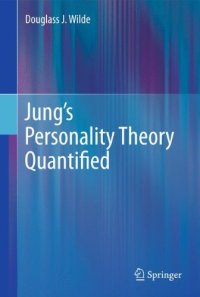
Ebook: Jung’s Personality Theory Quantified
Author: Douglass J. Wilde (auth.)
- Tags: Psychometrics, Management/Business for Professionals, Personnel Management, Psychoanalysis, Engineering Economics Organization Logistics Marketing
- Year: 2011
- Publisher: Springer-Verlag London
- Edition: 1
- Language: English
- pdf
Jung's Personality Theory Quantified fills an urgent need for professionals using the Myers-Briggs Type Indicator® (MBTI) to map it on to the cognitive modes of Jung’s personality theory, avoiding potential logical errors in the traditional “type dynamics” method. It furthers Jung’s original concepts while placing them on a solid axiomatic basis not possessed by other personality theories. Bringing these quantitative findings to the millions of MBTI users – managers, consultants, counsellors, teachers, psychoanalysts and human resource professionals – will require further education of those already certified to administer the instrument according to type dynamics. For this reason numerical exercises follow most chapters to make the book a source reference for briefer workbooks usable in enhanced certification programs. Backed by quantitative theory and new graphical methods, the pioneering qualitative typology work of Myers and Briggs is thus extended to yield deeper understanding of the vital topics of human personality, creativity and human relations. Jungian psychoanalysts may find Jung's Personality Theory Quantified helpful in organizing complicated clinical information and it can also enhance the work of MBTI practitioners worldwide.
Jung's Personality Theory Quantified fills an urgent need for professionals using the Myers-Briggs Type Indicator® (MBTI) to map it on to the cognitive modes of Jung’s personality theory, avoiding potential logical errors in the traditional “type dynamics” method. It furthers Jung’s original concepts while placing them on a solid axiomatic basis not possessed by other personality theories. Bringing these quantitative findings to the millions of MBTI users – managers, consultants, counsellors, teachers, psychoanalysts and human resource professionals – will require further education of those already certified to administer the instrument according to type dynamics. For this reason numerical exercises follow most chapters to make the book a source reference for briefer workbooks usable in enhanced certification programs. Backed by quantitative theory and new graphical methods, the pioneering qualitative typology work of Myers and Briggs is thus extended to yield deeper understanding of the vital topics of human personality, creativity and human relations. Jungian psychoanalysts may find Jung's Personality Theory Quantified helpful in organizing complicated clinical information and it can also enhance the work of MBTI practitioners worldwide.